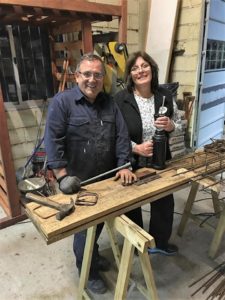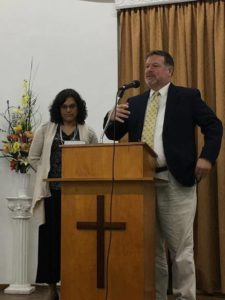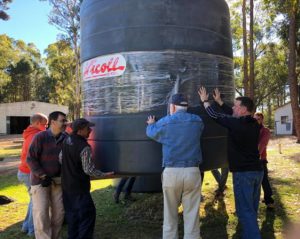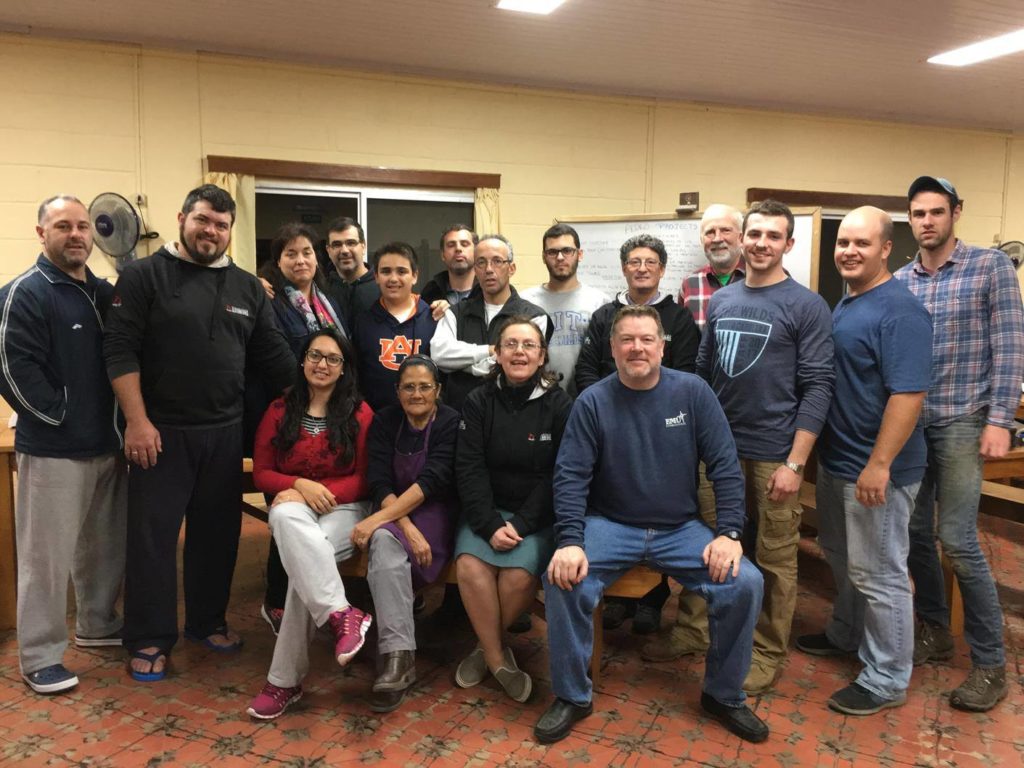“Wow! That smells good!” exclaimed one of our team members as we approached the back porch of the dining hall at Camp Emmanuel in Guazivirá, Uruguay. Carlos Alberti, the husband of our camp secretary had “fired up the grill” for us. He was preparing for us Asado, a word that describes barbecued meat. Most of South America’s diet revolves around legumes and cereals (beans, corn, and rice), but not Uruguay. This small South American country with a population of 3 million people, has been called “one big farm.” Cattle outnumber people by four to one. Uruguay boasts the highest cattle per capita rate in the world. The average Uruguayan consumes 208 pounds of meat per year, again the highest rate in the world. Their meat is known for its quality. Asado is not only a staple part of the Uruguayan diet, it is an expression of their cultural identity.
 The term Asado may refer to the way the meat is cooked, but it also may refer to the meal itself, where barbecued meat is the main element. This could be short ribs (asado de tira), beef (carne asado), chicken (pollo asado) or pork (asado de puerco). As the meat cooks slowly, there is no need for heavy sauces or marinades. The time preparing the meal affords a wonderful opportunity to just hang out together. The Asado is an opportunity for the Uruguayan people to come together. It is a social activity.
The term Asado may refer to the way the meat is cooked, but it also may refer to the meal itself, where barbecued meat is the main element. This could be short ribs (asado de tira), beef (carne asado), chicken (pollo asado) or pork (asado de puerco). As the meat cooks slowly, there is no need for heavy sauces or marinades. The time preparing the meal affords a wonderful opportunity to just hang out together. The Asado is an opportunity for the Uruguayan people to come together. It is a social activity.
What a great way to start our trip. Immediately our team was introduced to Uruguayan culture and immediately we all fell in love with the people we would be working with for the next eleven days.
We had arrived at the Montevideo Carrasco International airport earlier that morning. We left on October 21, the day before from Charlotte International. My wife Joanna drove me to Charlotte where I met up with the other five members of our team: Rick Jensen and his wife Kathy, along with three men from the Wilds Christian Camp, Paul Johnson, Ben Kashuba, and Joshua Woodfin. Paul works at the Wilds full-time on the maintenance staff. Ben and Josh are both part of the Wilds Camp Apprenticeship program. In addition to our own luggage, we also each had a 50-pound box containing clothes and tools for our work projects. We had packed stainless steel cable, 10 pounds of screws, plus a couple of hammer drills, batteries, chargers, copper sulfate, and several small personal tools. All of our baggage was checked and then we made our way through security without any problem. After a short delay, we departed for the first leg of our trip which took us to Miami. Our flight left Miami at 10:40 p.m. I don’t believe there was an empty seat on the flight. Shortly after take-off, we were served our supper. There may be some of you that enjoy airplane food, but for each one of us, we would rather have the Asado.

After a nine-hour flight through the night, we arrived in Uruguay. We made our way through customs with only a small hiccup. One of the customs officials flagged a couple of our boxes. When asked what was in the boxes, I explained that we were on a mission trip to work at Camp Emmanuel and that the boxes just contained tools and clothes. He waved us through without even opening the boxes, praise the Lord!
We were welcomed by three of our missionaries. We quickly divided the luggage among the three vehicles and were on our way for the 45-minute drive to Camp Emmanuel. This was my third trip to Uruguay to visit the camp. The other two trips were to preach and to participate in the camp program. This trip had a different focus. For over a decade now, work trips have been organized usually in the Fall for the purpose of improving the facilities and grounds of our mission properties, primarily our camp ministry. These trips have come to be called “Rick Trips,” after Rick Jensen, the brother of our current director. Rick, as best as he can recall, has made 13 of these work trips.
After a brief time to unpack our luggage, Pedro showed our team around the camp. For the three men from the Wilds, this was their first trip to Uruguay. Each of them was impressed with the facilities and with the philosophy of the ministry. In a way, they felt right at home. As we walked, we could smell the smoke from the parilla (the grill). As we made our way to the dining hall, we met several of the other missionaries that would be joining us for the week. Immediately, our newbies were introduced to the Uruguayan custom of greeting each other with a big hug and a “holy kiss.” They also were introduced to the jovial nature of the Uruguayan believers. Their personalities ooze with the joy of the Lord.
Then there was the smell of the meat. We were all getting hungry as we waited. The Asado is prepared over clean burning, wood-based coals, which is a slow process, but well worth the wait. While we waited, we began to organize some of the clothing that we brought so that we could distribute it to the Uruguayans.
Finally, it came time to eat. We enjoyed our meal very much. It was like beef spare ribs. In addition, Carlos had prepared a Chimichurri Sauce which we used on our papas fritas (French fries) and arroz (rice) and as a condiment for the meat. The sauce, similar to a pesto, is made of finely chopped parsley, minced garlic, red pepper flakes, and fresh oregano. The food was delicious, but the fellowship is what made our first meal so special.
 After a meal like that which had followed an all-night flight, we were all ready for a little rest. After about an hour, Ovidio Acevedo drove the three men from the Wilds and me to his church in El Cerro de Montevideo. It took us approximately two hours to reach his church. We enjoyed a nice drive through the Uruguayan countryside and the Northern part of the city. I had preached at Emanuel Church on my first trip to Uruguay in January of 2016. Chicha Rodriguez joined us so that she could interpret for us. Paul, Ben, and Josh shared testimonies and then I preached from Galatians 6:1-5, on “Mending a Broken Body.” Following the message, the church hosted a special fellowship time to celebrate Ovidio’s birthday.
After a meal like that which had followed an all-night flight, we were all ready for a little rest. After about an hour, Ovidio Acevedo drove the three men from the Wilds and me to his church in El Cerro de Montevideo. It took us approximately two hours to reach his church. We enjoyed a nice drive through the Uruguayan countryside and the Northern part of the city. I had preached at Emanuel Church on my first trip to Uruguay in January of 2016. Chicha Rodriguez joined us so that she could interpret for us. Paul, Ben, and Josh shared testimonies and then I preached from Galatians 6:1-5, on “Mending a Broken Body.” Following the message, the church hosted a special fellowship time to celebrate Ovidio’s birthday.
We arrived back at camp for a late supper and then were ready for a long night’s rest. The temperature that evening was in the low 50’s. That is not so bad other than we didn’t have any heat in our cabins. We all went to bed wearing sweats and covered ourselves with heavy blankets.
We began Monday morning like we would each day for the next six days. Breakfast each day was at 7:30 a.m., followed by a brief organizational meeting to give assignments for the day. Pedro had placed in the dining hall a white board that listed each of the tasks and the workers who would be joining us. Each task had a little box where we could check it off after the task was completed. Next to each task was a list of the assigned workers, although most of us floated between the different jobs. The board listed 18 different Uruguayans that would be joining us for all or part of our time working. We also had six different ladies that worked in the kitchen to help us with our meals.
 On our “to do” list we had the following:
On our “to do” list we had the following:
(1) Replace the metal roof on the dining hall
(2) Replace four water heaters in the cabin areas
(3) Repairs to the playground area
(4) Replacement of the bridge which spans the wetland which separates the soccer field from the obstacle course
(5) Replacement of chapel lighting and changing lights around the campsite
(6) Repair of bunk beds in two of the cabins
(7) New concrete tables
(8) Repair of the kitchen wall and steps which were damaged by a hurricane earlier this year
(9) Install two 10,000 liter water tanks, which required building a post foundation, installing rebar, and pouring a concrete pad, and then wiring the electrical systems and connecting all of the plumbing to the main water system.
Each day began with breakfast at 7:30 a.m., followed by a full day of work. We normally would break at noon for lunch and then at 5:00 p.m. for tea. We would stop working around 8:00 p.m. each evening when it started to get too dark. We then would gather again for supper each evening at 8:30 p.m.
 On Monday, the majority of our workers began the process of removing the old roof from the dining hall. Paul and Josh began to survey the situation for the water heaters. Ben and I began to move a pile of gravel that we knew we were going to need later in order to mix concrete. We then began the process of bending and tying rebar for the foundation of the water tanks. Later in the day, we began the process of making repairs to the playground area.
On Monday, the majority of our workers began the process of removing the old roof from the dining hall. Paul and Josh began to survey the situation for the water heaters. Ben and I began to move a pile of gravel that we knew we were going to need later in order to mix concrete. We then began the process of bending and tying rebar for the foundation of the water tanks. Later in the day, we began the process of making repairs to the playground area.
Our team from the United States really enjoyed trying to communicate with the Uruguayans. Paul had taken three years of Spanish when he was in school and after a couple of days, he began to communicate fairly well. Josh and Ben didn’t know any Spanish but tried very hard to communicate. By the end of the trip, they were doing well and picked up a lot of Spanish. I had been studying Spanish for the past few months in hopes that I will be able to communicate with our missionaries. I was surprised when I read that Spanish is the second most spoken language in the world spoken by native speakers. Chinese is number one and English is number three. Learning Spanish will greatly benefit me in my ministry as the future director of EMU International. On the first day, I really struggled and wondered why was I even trying to learn Spanish, but after a day, my ears started to get adjusted and I started communicating with the Uruguayans. It was a lot of fun as they tried to speak English and we tried to speak Spanish.
Over the next couple of days, we were able to finish the work on the new water heaters and we were able to remove the old roof and begin installing the new roof panels. The old roof was just metal panels. The new panels are much sturdier and are backed with about an inch of Styrofoam insulation. We had to also flash the edges and apply caulk and cement to prevent any leaks.
 Our plans for the base of the water tanks changed as we discovered that the cinder blocks that we were going to use for the pillars were very brittle. This necessitated us building forms for pillars that we ended up filling with concrete. That meant that we needed more rebar. The first few days, several of us spent a lot of time bending and tying rebar. We needed to build a platform for the water tanks because they need to be above the pumps. The foundation has to be very solid. Each one of the tanks holds 10,000 Liters. When full, each tank will weigh over 22,000 pounds. It took us about three days to build and fill the forms and then came the construction of the platform. That meant even more rebar.
Our plans for the base of the water tanks changed as we discovered that the cinder blocks that we were going to use for the pillars were very brittle. This necessitated us building forms for pillars that we ended up filling with concrete. That meant that we needed more rebar. The first few days, several of us spent a lot of time bending and tying rebar. We needed to build a platform for the water tanks because they need to be above the pumps. The foundation has to be very solid. Each one of the tanks holds 10,000 Liters. When full, each tank will weigh over 22,000 pounds. It took us about three days to build and fill the forms and then came the construction of the platform. That meant even more rebar.
The Lord blessed us with beautiful weather. Temperatures in the evenings were in the upper 50’s and highs each day were around 70 degrees. Rick was able to finish the final caulking around the flashing on Friday morning. The Lord graciously held off any rain until the roof was completed. Then that afternoon we had rain for the rest of the day. We were wanting to have the platform ready to pour on Saturday morning so several of us donned garbage bags as ponchos and continued to work through the cold torrential rain. It was worth it because on Saturday morning, we were ready to mix and pour the concrete for the platforms.
 I think we all enjoyed warm showers after the rain. Supper that evening was especially fun. As I mentioned above, meals for the Uruguayans are an event. They are not only an opportunity to feed the body, but also to nourish the soul. We enjoyed laughing together and even playing together. Rick had brought several puzzles that we all had fun trying to conquer. Several of the evenings we played Uno together. We also gathered around my Ipad and watched my daughter play soccer for the BJU Bruins through their Livestream broadcast.
I think we all enjoyed warm showers after the rain. Supper that evening was especially fun. As I mentioned above, meals for the Uruguayans are an event. They are not only an opportunity to feed the body, but also to nourish the soul. We enjoyed laughing together and even playing together. Rick had brought several puzzles that we all had fun trying to conquer. Several of the evenings we played Uno together. We also gathered around my Ipad and watched my daughter play soccer for the BJU Bruins through their Livestream broadcast.
When Saturday came, it was all hands on deck as we mixed and poured the platform for the tanks. We also were able to make considerable progress on the swinging bridge in the teen area. Several of us worked in the shop cutting and routing wood for the bunk bed repairs. Saturday was a very profitable day and we were starting to check off our list.

On Sunday, our group from the United States enjoyed a trip up the coast and did a little bit of sightseeing. We returned to camp for a brief time to rest and then we visited two different churches. Rick and Kathy, along with Ben and Josh visited Carlos Olivera’s church in Pando. They each shared their testimonies. Paul and I traveled with Pedro Donzé to Getsemani church pastored by Gaby Gomez. Paul shared his testimony and I preached on Matthew 9:35-38, on “A Plentiful Harvest.”
Monday and Tuesday were spent on finishing the projects that we had begun so we could have all of the boxes on the whiteboard checked as completed. We had to leave for the airport at 5:00 p.m. on Tuesday so we needed to complete everything in time to pack and to clean. Tuesday morning, right after breakfast, it was again all hands on deck for the water tanks.

This time we had to move the 250-pound tanks and place them on the platforms. Each of the tanks was 8 feet in diameter and very awkward to move. Rick spent the rest of the morning and early afternoon hooking up the plumbing for the tanks. The rest of us finished work on the bunk beds, the bridge, and the lights. We finished in time to get everything packed and our cabins cleaned so we could depart for the airport on time.

As we traveled to the airport I asked the guys for lessons that they had learned from the trip. It seemed like the consensus was that all of us were impressed by the great love the Uruguayan believers had for each other and for us. Their love was not put on, but genuine. They truly loved each other. We were impressed that we had men including pastors from five different churches. They all came together and worked for a common cause and as a result, much was accomplished for God’s glory.
Romans 15:5-6 says, “Now the God of patience and consolation grant you to be likeminded one toward another according to Christ Jesus: That ye may with one mind and one mouth glorify God, even the Father of our Lord Jesus Christ.” Paul is praying that God would give the believers a spirit of unity. The source of our unity comes from God through Jesus Christ. Jesus said, “By this shall all men know that ye are my disciples, if ye have love one to another.” John 13:35 The first Christians took this so much to heart that the pagans said of them, “Behold, how they love one another.”
I am reminded of a word that we read on the Kenyan Coat of Arms. It is the motto for that country, “Harambee.” It is a Swahili word which means, “let us all pull together.” Picture a group of men that are all pulling on the rope in the same direction. What direction? Romans 5:6 says we are to focus on God’s glory. Picture a group of men working together, even though they are from different churches, but they are coming together for the same purpose, a purpose that is stated on the walls of the dining hall at Camp Emanuel, “Whether therefore ye eat, or drink, or whatsoever ye do, do all to the glory of God.” 1 Corinthians 10:31.
We witnessed that spirit of harambee on our trip to Uruguay as we worked together, as we laughed together, and as we ate together. It all began with the big hug, a “holy kiss,” and then the Asado, not the food, but the event. Imagine what could happen if believers all pulled together.
We want to thank each of our donors who prayed for us and also those who contributed to make this trip possible. We have received $28,745 which has gone to the camp project. As in any ministry, there is always more work to do and more work means the need for more funds. Please continue to pray for our work in Uruguay and also EMU’s missionaries serving around the world.
Please visit http://emuinternational.org/camp to view a photo gallery containing a journal of our work trip to Uruguay.